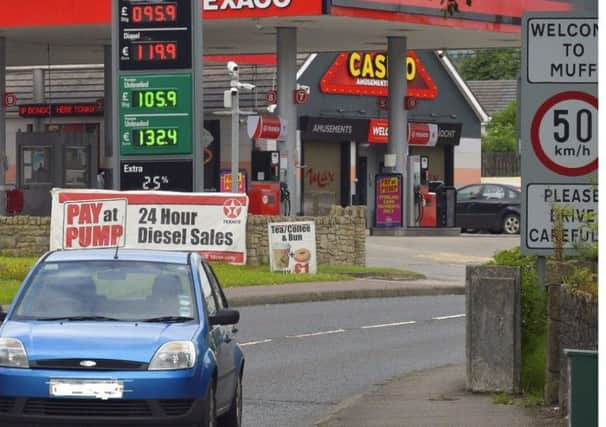Carbon tax hikes will hit border stations


The Irish Department of Finance believes excise and VAT revenues generated by people filling up at Bridgend, Muff and Killea, could be reduced or eliminated by progressive environmental taxing.
A new consultation on options for the use of potential additional revenues arising from higher Carbon Tax rates warns that while such measures would bring in cash this would be offset by reduced fuel revenues along the border.
Advertisement
Hide AdAdvertisement
Hide Ad“Another Exchequer exposure arising from increases in the Carbon Tax is loss of excise and VAT revenues that currently comes from cross border fuel tourism,” the consultation document states.
“The Economic and Social Research Institute (2018) has estimated that the Exchequer directly benefits by around €230m annually through cross border tourism in diesel and petrol. Any reduction or elimination of the price differential North and South would see a reduction or elimination in the Exchequer gains from cross-border fuel tourism.
“This could also be impacted by currency movements, for example if sterling were to weaken significantly against the Euro,” it observes.
ESRI’s ‘The scale of ‘fuel tourism’ across the Irish border’ report, cited above, points out that fuel prices in the South are generally lower than in the North and that this was what was driving “fuel tourism” from Derry to Bridgend and elsewhere.
Advertisement
Hide AdAdvertisement
Hide Ad“The set of stations near the border sells an average of 54 per cent more diesel and 15 per cent more petrol than equivalent stations far from the border, taking their other characteristics into account.
“This implies that fuel tourism contributed tax receipts of about €28 million from petrol and €202 million from diesel at 2015 rates, taking VAT into account along with excise and carbon taxes,” the ESRI report declares.
ESRI found that fuel tourism generated about 1.17 million tonnes of CO2 emissions in 2015, or under 2 per cent of Ireland’s greenhouse gas emissions that year. The Department of Finance has reported that Carbon Tax generated revenues of over €3 billion since its introduction in 2009 with receipts of €440m projected for 2019.
“The current rate of the Carbon Tax is €20 per tonne on all applicable fuels. The Climate Change Advisory Council have recommended the rate be increased to €80 per tonne by 2030, while the Joint Oireachtas Committee are of the view that a carbon price trajectory would play an important role in the State’s response to climate change.”